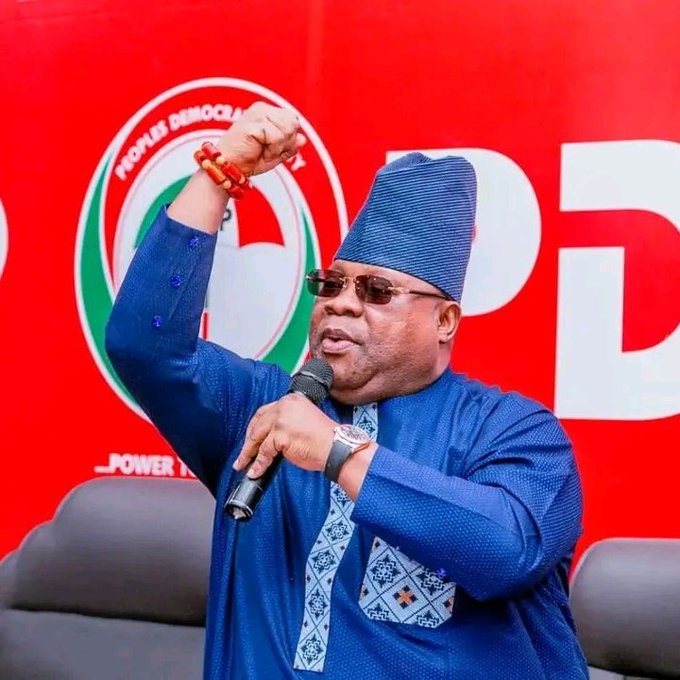In a dramatic twist to the ongoing chieftaincy dispute in Osun State, an Osun High Court sitting in Ile-Ife on Thursday ruled in favor of Oba Adegboyega Famodun, restoring him as the Owa of Igbajo and nullifying the controversial order by Governor Ademola Adeleke that had previously revoked his appointment.
The ruling, delivered by Justice A.O. Ayoola, delivered a significant legal blow to Governor Adeleke’s administration, reaffirming that the appointment of Oba Famodun was validly conducted and should not have been annulled by the state government.
Governor Adeleke’s actions had sparked public outcry when, on assuming office in late 2022, he issued a White Paper that revoked Famodun’s appointment and called for a fresh selection process. The controversy stemmed from a chieftaincy review set up by the state government in response to concerns about the validity of the selection process that had led to Famodun’s ascension.
The matter first gained prominence when the state government released a series of White Papers in January 2024 following investigations into various chieftaincy titles within Osun. Among these was a ruling that invalidated the selection process for the Owa of Igbajo title. In the aftermath, Gov. Adeleke issued an Executive Order, effectively removing Oba Famodun from the throne.
Oba Famodun, however, did not take this decision lying down. Through his legal team, he challenged the revocation in court, arguing that his appointment had followed due process and adhered to all necessary legal protocols. He maintained that his ascension to the throne was not only in accordance with tradition but also backed by the legitimacy of former Governor Adegboyega Oyetola’s administration, under whose leadership he was appointed in 2022.
“The appointment of Oba Adegboyega Famodun as Owa of Igbajo was carried out in full compliance with the law, and the subsequent revocation by the state government had no legal basis,” his counsel argued during the proceedings.
The case stirred considerable attention in Osun State, as it appeared to set the stage for a larger legal and political clash between the ruling PDP government under Governor Adeleke and the legacy of the previous APC-led administration of Oyetola. In a state known for its vibrant political dynamics, such a decision had significant implications for the future of chieftaincy matters and the governance of local communities.
In Thursday’s ruling, Justice Ayoola declared that both the Executive Order issued by Governor Adeleke and the White Paper, which revoked the Owa of Igbajo’s title, lacked legal standing and were fundamentally flawed. The court emphasized that there was no justifiable legal or traditional reason to annul the validly conducted chieftaincy process that had led to Famodun’s appointment.
“The actions of the Osun State Government, as represented by the Executive Order and the White Paper, are hereby set aside,” Justice Ayoola stated. “The appointment of Oba Adegboyega Famodun as the Owa of Igbajo stands as valid and is reinstated with immediate effect.”
The ruling was met with cheers and jubilation by supporters of Oba Famodun, who had long argued that his removal was politically motivated. Many local stakeholders had expressed concerns over the growing trend of political interference in traditional matters, believing that it threatened the autonomy of local monarchs and the cultural significance of chieftaincy institutions.
In a statement issued shortly after the ruling, Oba Famodun expressed gratitude to the judiciary for upholding the rule of law.
“I am deeply grateful to the court for restoring the dignity of the Owa of Igbajo throne,” Oba Famodun said. “This victory is not just for me, but for the people of Igbajo and the integrity of our traditional institutions. I remain committed to serving my people and ensuring that our community continues to thrive.”
The reinstatement of Oba Famodun comes at a time when there is increasing attention on the delicate balance between political power and traditional authority in Nigeria. The dispute in Osun State highlighted the ongoing tensions between elected government officials and the custodians of traditional leadership, who often find themselves at odds with political agendas.
For Governor Adeleke, the court’s ruling is a setback in his efforts to restructure the chieftaincy process in Osun. While the state government has yet to issue a formal response, political observers have noted that the Governor’s administration will likely face further scrutiny over its handling of traditional matters.
A political analyst from the state, who spoke on the condition of anonymity, commented on the broader implications of the ruling. “This case is more than just about one individual; it reflects the complex relationship between politics and tradition in Nigeria. The ruling today may force politicians to reconsider how they engage with traditional institutions in the future.”
Despite the legal setback, Gov. Adeleke’s administration has made efforts to push through reforms aimed at addressing chieftaincy issues in the state. However, this decision serves as a reminder of the power of the judiciary in holding political actions accountable.
Oba Famodun’s reinstatement also comes as a boost to his standing among his people, who have consistently supported his leadership. The Owa of Igbajo’s influence is significant, with the town of Igbajo being one of the largest towns in Osun State and home to a strong network of influential political and cultural figures.

